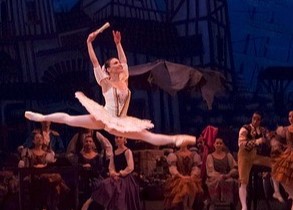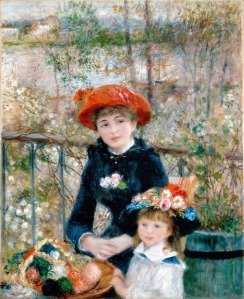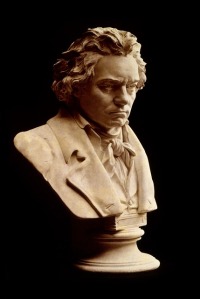I went with my wife to a poetry reading to read poems I’d written, and before starting, talked with other people who were there to read theirs. I’d never spent much time with poets, but before beginning the readings there was wine and cheese and I talked with some of the others. As my wife and I found seats, I asked her, “Do you think all poets are as meek as these poets?” I had the same impression during the readings. So many seemed to lack confidence. The lack of confidence is very hard to hide
I wondered if they also lacked confidence when they were writing and how that affected the quality of their work. Then I thought of all the many talented writers, painters, dancers, and actors I’ve known, some of them very close to me, who also lacked confidence or who once had confidence and lost it, and because of that ended their artistic careers prematurely. So I thought this blog post might encourage an artist or two to have confidence and persevere.
This post says, “Take heart”:
 You must never lose the faith that you have the ability to produce quality art successfully and consistently. The desire to succeed and the confidence that you can, along with skill and the ability to overcome obstacles are the most important indicators of eventual success in art.
You must never lose the faith that you have the ability to produce quality art successfully and consistently. The desire to succeed and the confidence that you can, along with skill and the ability to overcome obstacles are the most important indicators of eventual success in art.
Artists fail because (a) they lack the necessary skill or (b) they have the skill but don’t have the confidence to use that skill well. If you have confidence and faith in yourself, you’ll reach higher levels of success than other writers, painters, dancers, actors, and performers of equal ability who lack them.
Artists who are sure of their abilities, sure of themselves, intensify their efforts when they fail to achieve their goal, and persist until they achieve it. Self-confidence is the ultimate source of an artist’s motivation.
All great artists of the past were confident.
The will of a successful artist must be indestructible.
Learned Helplessness
“Learned helplessness” has destroyed the careers of many artists who had all the potential they needed to excel. They met failure and they never recovered. Failure is a necessary part of an artist’s life, bringing with it growth and new learnings, and sometimes sudden leaps in performance. No one met more failures and took more wrong turns and was more average than Walt Whitman until suddenly, seemingly without any preparation, he wrote Leaves of Grass and established himself as America’s greatest poet—ever. If you’re not failing some of the time, you’re not aiming high enough.
Helpless artists believe that no matter what they do, their actions will not lead to success. Consequently, they give up. Learned helplessness was first observed among young animals which had been placed in a situation in which they received inescapable electric shocks. When placed in a different situation, they made no attempt to escape or avoid the shock—they had learned to be helpless. Like those animals, when people believe that their actions will have no effect on what happens to them, they also become passive.
Helpless-oriented artists attribute their failures to personal inadequacies—they’re think they’re not smart enough, or not talented. Their thinking is self-defeating. Their expectations are negative—“I won’t succeed. This problem is too much for me.” The act of painting/dancing/ writing becomes unpleasant, even painful, an activity to be avoided. Helpless artists lose focus and can’t concentrate. They worry, continually question their worth as artists, and begin to put out less and less effort. Good work habits disappear. They avoid challenges and risks. Their performance declines.
Disappointment Needn’t Lead to Discouragement
You’re an artist; you know what it is to be discouraged. When you’re deeply discouraged you’re weak and vulnerable. You’ve been deprived of confidence, hope, and spirit. Your courage and strength abandon you. If you’re to succeed you must get them back right away, taking immediate action with strong determination. Lay the discouragement aside as though putting it in a drawer. Get back to your work. The will of a successful artist needs to be indestructible.
Rather than conceiving of yourself as a beaten person, hold a completely different view: you are a person who has been set back—as happens–but yet a person with important accomplishments ahead and a rich life of creativity to lead, a decisive, courageous, fearless person.
 Self-doubt and self-confidence are affected by the comments of other people. Someone saying, “You can do it; don’t give up” can save a career. Seek out encouraging, supportive people. When Impressionism was beginning in Paris in the nineteenth century, and the Impressionists were being attacked on all sides by critics, other artists, and the public, they banded together and met frequently in their homes and cafes. Their mutual support strengthened them all. Today artists and writers living great distances apart, strangers to each other, support and encourage one another via networks of blogs.
Self-doubt and self-confidence are affected by the comments of other people. Someone saying, “You can do it; don’t give up” can save a career. Seek out encouraging, supportive people. When Impressionism was beginning in Paris in the nineteenth century, and the Impressionists were being attacked on all sides by critics, other artists, and the public, they banded together and met frequently in their homes and cafes. Their mutual support strengthened them all. Today artists and writers living great distances apart, strangers to each other, support and encourage one another via networks of blogs.
Accepting setbacks as an unavoidable part of the artist’s life is essential for maintaining an unshakeable motivation and the high spirits needed to do good work. Look for what caused the discouragement and make decisions as to how to move forward now. Maintain a sense of proportion—“It’s bad, but it’s not that bad.”
James Joyce’s Dubliners was one of literature’s landmark collections of short stories. It was rejected by twenty-two publishers, but Joyce never lost confidence in himself or faith that it would be published. Jack London’s stories were rejected 600 times before the first one was published, but within two years after that first success he was one of the most popular novelists in the world. Publisher after publisher rejected e.e. cummings’ first book of poetry, but he wasn’t deterred and continued writing. When it was finally published, he included a dedication which read, “With no thanks to…” followed by the long list of publishers who had turned it down.
 Resilient artists adapt. What could be more discouraging for a composer than losing his hearing and being unable to hear the music he was creating? At 51 Beethoven was deaf. As a substitute for hearing the actual sounds, he removed the legs of his piano and placed it on the floor so he could feel the vibrations of the music.
Resilient artists adapt. What could be more discouraging for a composer than losing his hearing and being unable to hear the music he was creating? At 51 Beethoven was deaf. As a substitute for hearing the actual sounds, he removed the legs of his piano and placed it on the floor so he could feel the vibrations of the music.
Discouragement is so much a part of the creative person’s existence that if you don’t develop the resiliency and energy to recover from it, you will have difficulty surviving.
Confidence and Faith
Maintain an optimistic frame of mind: “I’m in a funk, nothing clicking, the ideas not coming. Discouraged. But I’ve come out of this kind of thing before and I will again. I am (your name), the same person who… (wrote, painted, won, achieved…) and I can again.” Persist.
Look to your past successes. Past success is the most powerful and direct basis for confidence. If you have proof that you have the ability to achieve what you want to achieve—the skills, motivation, and know-how– because you’ve succeeded in the past, you will try to achieve it again. If you feel that way, you’ll be confident and will not likely be stopped by self-doubt, an artist’s main psychological obstacle. You’ll have high expectations of success. You won’t dwell on past failures; you’ll think about them not as true failures, but as temporary conditions and useful lessons, bumps in the road, not the end of the road. You’ll dwell on past successes. Even the most self-doubting artist has had past successes to reflect on. There is always something positive to fasten onto during periods of doubt.
Develop your skills. As your skills improve, your self-doubt fades and is replaced by confidence.
Don’t be intimidated by difficulty; don’t hide from challenges. Rather, seek them out, welcome them. You progress by tackling increasingly difficult challenges. Two artists may be equally competent. The one who has an effort-will-win-out-and-my-skills-can-improve orientation will not be discouraged by initial difficulty. But the “helpless” artist will immediately lose confidence and may not recover.
Recover quickly. Temporary self-doubt after a setback is a natural reaction. What matters most is how quickly you take action and regain your confidence.
Bearing this post in mind and practicing these prescriptions should increase your confidence, and that should be reflected in your perseverance and the success of your work.
© 2015 David J. Rogers
For my interview from the international teleconference with Ben Dean about Fighting to Win, click on the following link:
Order Fighting to Win: Samurai Techniques for Your Work and Life eBook by David J. Rogers
or
Order Waging Business Warfare: Lessons From the Military Masters in Achieving Competitive Superiority
or


Great post David, as you so rightly say confidence is the key, and I am one of the fortunate ones because I was given the gift of self-confidence following emergency brain surgery. I am now able to live the life of a confident person and it is like a magic carpet has unfurled in front of me, From exhibiting my paintings quietly at a local café to soon be exhibiting in a fine art gallery in New York my world continues to expand and I can just take it all in my stride!
LikeLike
What a sad thing to have happen to you, but what a powerful and career-changing, life-changing outcome. At a certain time my life also seemed to take off on its own and to soar to unexpected heights–your magic carpet. Yours is an inspiring story, Michelle, which people should be made aware of. Congratulations on your success, which I’m sure is the result of extremely hard work on your part developing your skills and the never-flagging confidence that eventually you’d succeed. I’m sure too that some of your success, particularly dealing with gallery people and clients, is a result of the fetching personality that comes through in your writing.
LikeLike
David, you never said you were a poet! I fear i would be one of those shy poets, bold on the page but knock kneed on stage. I’m definitely getting braver though – i read my poem out to an audience of 50+ at the book launch of our writer’s group 25th anniversary anthology…and it was fun! I feel confident and capable with my writing and indeed most things i do – a good upbringing i suspect – but i am a very private person and don’t share intimate things very easily. That’s one of the the things that i wanted to overcome with my blog. Sometimes too, and i wonder if this is a feminine thing, i don’t back myself as much as i should, or take risks where i could. Practicing there too!
LikeLike
Hello, Sara, fear of public speaking is not a feminine thing. Once I was painfully afraid to speak in public, but then got a job teaching at a university and had to. Then I set my mind to become a “great” public speaker and developed that craft and eventually became a professional speaker in high demand and was hired to speak to audiences of thousands. Now there is hardly anything I would rather do than speak to huge audiences. Will the same thing happen to you? Oh yes, I’ve had poetry published and short stories and memoirs and of course two print books that were international best sellers. I recently revised them and the are now ebooks. I wish you well in your new public speaking career, and should say this: the majority of really good public speakers initially were afraid and overcame their fear and excelled. Psychologists call that over-compensation. The secret of effective public speaking are preparation and the insight that you are performing–using the skills of an actor. That insight alone will change you.
LikeLiked by 1 person
Oh yes, I know the fear of public speaking is not a feminine thing, and I also know that year by year I get better at it. I did the same thing you describe – over compensation – when I overcame my innate shyness. People look at me strangely when I tell them I’m shy, because I don’t come across that way. But I am an introvert and need plenty of quiet time away from people to recharge. Hey, guess what? I bought your book yesterday 🙂
LikeLike
Your shyness certainly doesn’t come out in your writing, but I think that’s often the case. I’d bet that writing–and art generally– has a higher incidence of shy, introverted people than other pursuits. (But I think too that most people are shy in certain situations.) Growing up I was shy, but I’m not anymore. I have a friend who was extremely shy and missed out on a lot, and one day in college decided not to be shy. She completely changed her behavior. I wrote about that somewhere, so I suppose that’s happened to you. Thanks for getting the book. Just imagine I autographed it, “To my friend Sara. Best wishes.”
LikeLiked by 1 person
Done 🙂
LikeLiked by 1 person
Thank you Sir Rogers for sharing with me your worth reading blogs and allowing me to create vivid pictures while reading them. More power and God bless!
LikeLiked by 1 person
Prof. Memije-Cruz, so glad to hear from you again. As always, I appreciate your kind words and your support. I especially like your reference to vivid images because I try to write clearly, with that in mind. My best to you.
LikeLike